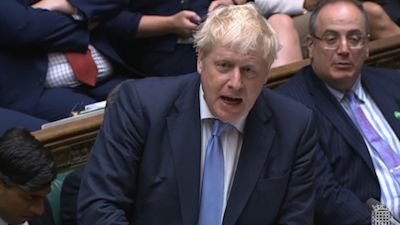MPs approve tax rise for Boris Johnson's NHS and social care reforms in snap Commons vote

ITV News Deputy Political Editor Anushka Asthana reports on the 'health and social care levy'
The government's controversial social care reform plans have won a majority in a snap Commons vote, with the tax rise proposals passing by 319 votes to 248.
MPs backed the government's plan to raise taxes to fund spending on the NHS and social care.
Just before the main motion passed, MPs voted against a Labour amendment calling for an assessment of the plan to bring in a new 1.25 percentage point tax increase for the NHS and social care. It was rejected by 335 votes to 243.
Despite reported opposition from some Conservative MPs, the main motion- to fund spending on the NHS and social care - sailed through the house on Wednesday evening with a margin of 71.
The motion centres around Boris Johnson's proposals to raise a "health and social care levy" by increasing National Insurance and dividend tax.
Critics, however, say most of the money will go toward reducing the huge NHS waiting list, rather than being spent on social care.
With the waiting list of more than five million people set to "get worse before it gets better", according to Mr Johnson, questions have been asked as to how any money raised will reach the social care system, with reforms not set to take place until October 2023.
ITV News Northern Correspondent Hannah Miller went to the town of Darwen in Lancashire to see what its residents make of the changes
Earlier in the day, Jake Berry, who chairs the Northern Research Group of Tory MPs, warned that the prime minister risked creating an “un-Conservative” and permanent “NHS tax” via his health and social care funding plan.
The former Conservative minister voiced concerns over the prospect of such a tax for people’s payslips given it will “never go down, it can only go up”.
The new 1.25 percentage point increase in National Insurance contributions - which breaks a manifesto pledge to not raise taxes - is expected to raise £36 billion for the health and social care system.
Health Secretary Sajid Javid has defended the two-year wait for social care reforms to be implemented and insisted some of the money raised from tax rises will be ring-fenced for social care.He said "at least £5.4 billion" will go towards implementing reforms to the social care system which will mean people pay less for their own care.
Pressed whether any of the cash for social care will reach the system by 2023, given the huge NHS backlog, Mr Javid said: "That £5.4 billion, that will be for social care - there's no doubt in my mind about that."
Under the current care arrangements, anyone with assets over £23,350 pays for their care in full - the government said the threshold was being raised to £100,000 to avoid “catastrophic and often unpredictable” costs for the less well off.
Nobody will have to pay more than £86,000 for care costs in their lifetime from October 2023.
Main social care reforms from October 2023:
No one with assets below £20,000 will pay a penny for care
Only those with assets over £100,000 will be expected to fully fund their own care
People with assets between £20,000 and £100,000 will get government support to pay for care depending on their finances
A cap of £86,000 on lifetime contributions to care will be introduced
The new system from 2023 is designed to ensure no-one will have to sell their home to pay for care, a pledge made by Prime Minister Johnson ahead of the 2019 general election.
At Prime Minister's Questions on Wednesday, Labour leader Sir Keir Starmer said planned tax rises would be "hammering" working people.
"The truth is his plans don't do what he claims. People will still face huge bills, many home owners will need to sell their homes, he's not denying it when he could have done."
Javid is asked if any of the health and social care levy actually go towards reforming care?
He added: "Who's going to pay for the cost of this failure? Working people... a care worker earning the minimum wage doesn't get a pay rise under this plan, but does get a tax rise. In what world is that fair?"
Tory opposition to the plans when first leaked was fierce, but any backbench rebellion appeared to have subsided after the vote easily passed through the Commons.
But the plan – along with another manifesto-breaking announcement to temporarily suspend the “triple lock” on pensions – moves Mr Johnson away from his traditional position of low-tax Conservatism.
The PM also refused to give a firm commitment that taxes would not go up again – although he said he did not want that to happen.
Watch Boris Johnson and Keir Starmer go head-to-head over social care at PMQs
Under the new levy a typical basic-rate taxpayer earning £24,100 would pay £180 more a year, while a higher-rate taxpayer on £67,100 would pay £715.
Labour and the Liberal Democrats opposed the measures in Parliament.
A YouGov poll found voters were split in their views on the national insurance rise.
Some 44% of those surveyed supported the move, while 43% were opposed.
Among Conservative voters there was 59% support and 34% opposition, while only a third of Labour supporters backed the move, with 55% in opposition.